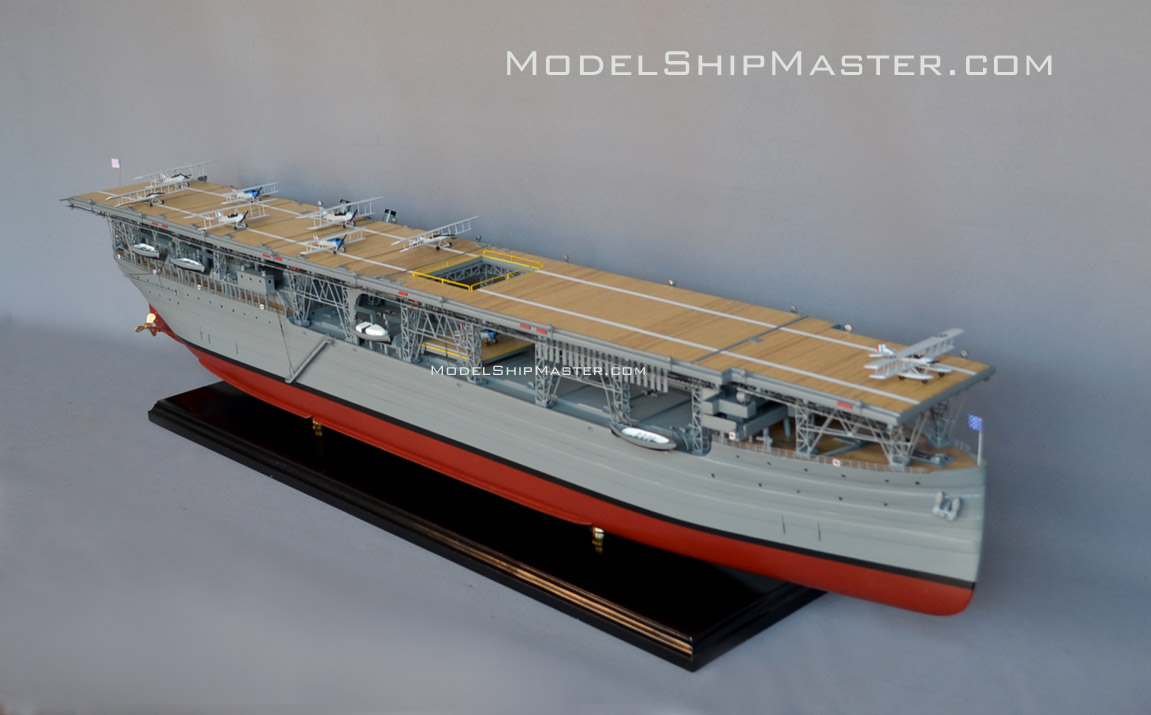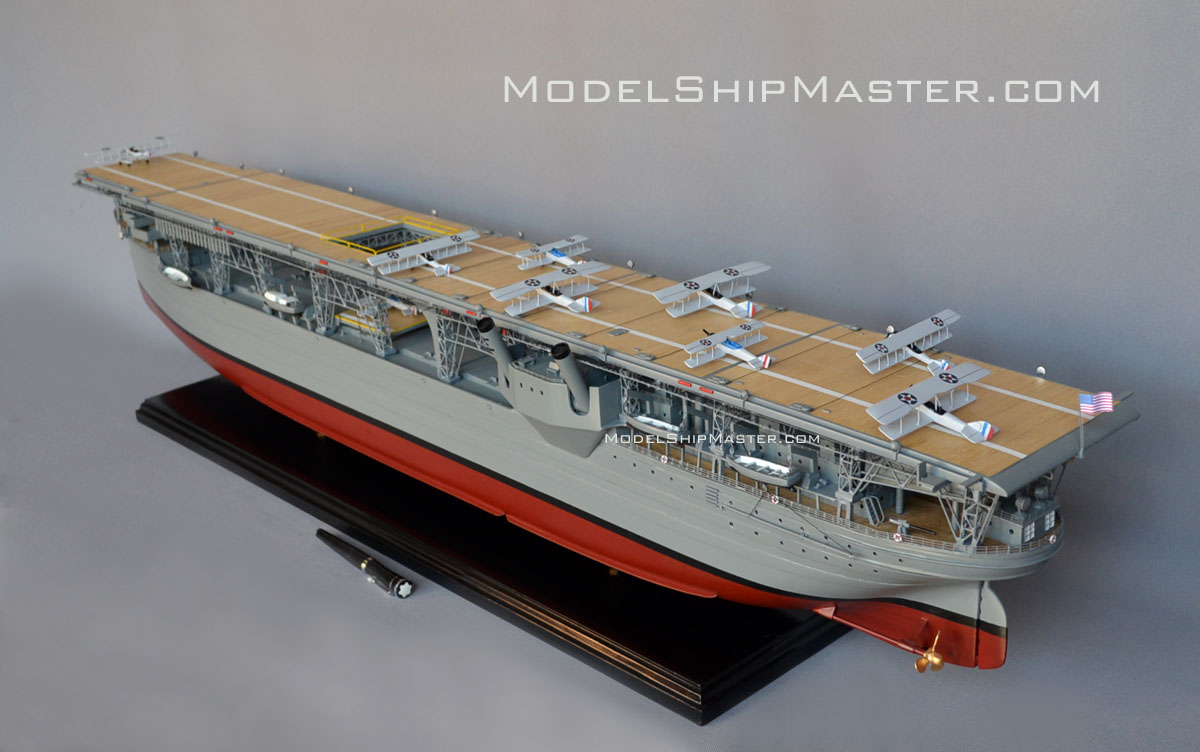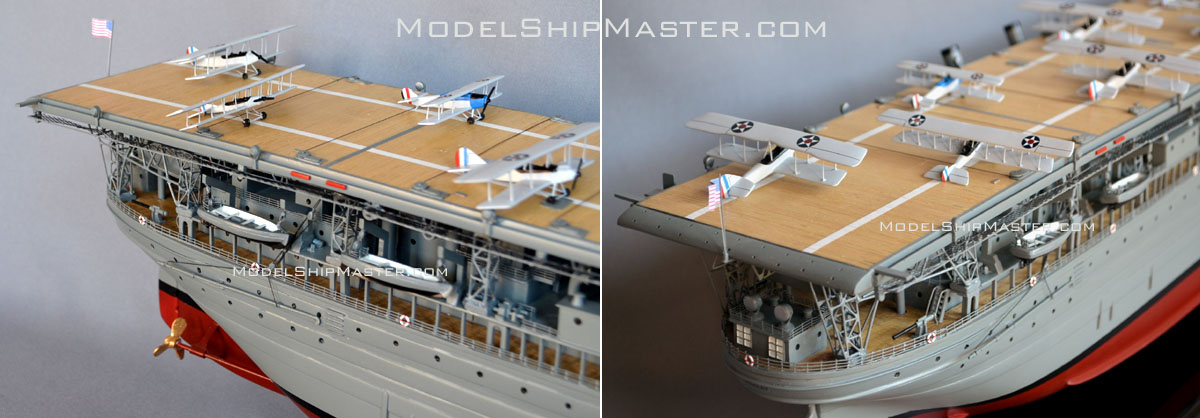USS LANGLEY MODEL
USS Langley was the very first
aircraft carrier of the US Navy. She also was the first
surface ship propelled by electric motors that
eliminated the use of then standard dangerous coal
burning furnaces. Of those navy aviators who served
aboard her, five became rear admirals, four
became vice admirals and four became four-star admirals.

On October 17,
1922, Lieutenant Virgil C. Griffin became the first
pilot to fly from the USS Langley's deck when he took off in
his Vought VE-7-SF biplane. This one launching was of
monumental importance to the modern US Navy.
Nine days later, with Langley underway,
Lieutenant Commander Godfrey de Courcelles Chevalier
made the first landing in an Aeromarine 39B. That
commenced the capability of launching aircraft from and
returning them
safely to a ship.
A month later, on Nov. 18, 1922, Cmdr. Whiting became
the first aviator to be catapulted from a carrier’s
deck.
Since USS Langley was built
primarily for testing and experimentation for seaborne
aviation, there was no control tower. Her flight deck covered the entire
ship from bow to stern, earning her the nickname
“Covered Wagon”.
USS Langley served as an
unarmed test bed for flight deck and flight operations
throughout the 1920s. During this time, the Navy would
learn from its experiences on Langley how better to park
and launch aircraft more quickly, which set the stage
for the fleet aircraft carriers that followed, such
as
USS Lexington.
An unusual feature of
the USS Langley aircraft carrier was the provision for a carrier pigeon house on the
stern. Pigeons had been carried
aboard seaplanes for message transport since World War
I, and were to be carried on aircraft operated from
Langley. The pigeons were trained at the Norfolk Naval
Shipyard while Langley was undergoing conversion. As
long as the pigeons were released a few at a time for
exercise, they returned to the ship; but when the whole
flock was released while Langley was anchored off
Tangier Island, the pigeons flew south and roosted in
the cranes of the Norfolk shipyard. The pigeons never
went to sea again and the former pigeon house became the
executive officer's quarters.

During World War II, On
Feb. 27, 1942, USS Langley was rendezvousing with two
destroyers off the coast of Indonesia. At about noon
she was attacked by nine Japanese dive bombers. Langley survived the first two strikes owing to her skipper's
skill at hard rudder turns and avoided two bomb waves.
But on the third, she took five hits. At about 13:30, Cmdr.
McConnell gave the order to abandon ship. Crew then
watched from the destroyer decks as they fired shells and torpedoes into her so she wouldn’t fall into
enemy hands.

We build this primarily wood
USS Langley
model in
two
sizes:
45" long x 10"
tall x 7" wide (1/144 scale)
$5,970. The photos are of this
size. It comes with
Vought VE-7F, Aeromarine 39-B, and Curtiss TS-1.
Shipping and insurance in
the contiguous USA included.
Other places: $500 flat rate.
33" long (1/200 scale)
$4,650 Shipping and
insurance in the contiguous USA included. Other
places: $400 flat rate.
Built per commission only. We require
only a small deposit to start the process $900  The
remaining balance won't be due until the model is
completed,
in about six months.
The
remaining balance won't be due until the model is
completed,
in about six months.
Nobody builds better
warships than ModelShipMaster.
Click
here
to find out. And click
here for our guarantee.

Learn more about the
USS Langley here:
https://en.wikipedia.org/wiki/USS_Langley_(CV-1)